Cary, North Carolina, Hgh State Clinic, Hgh Injections, Hrt Doctors
Cary, North Carolina Blood Testing Facilities
 Represents a LabCorp blood testing facility
Represents a LabCorp blood testing facility Represents a Quest Diagnostics blood testing facility
Represents a Quest Diagnostics blood testing facility

Nearby Labcorp Blood Testing facilities:
- Labcorp Center Distance: 4 m, 5911 Northwest Highway Ste 108, Crystal Lake, McHenry County, IL, 60014
- Labcorp Center Distance: 10 m, 1710 N Randall Road Ste 240, Elgin, Kane County, IL, 60123
- Labcorp Center Distance: 12 m, 450 Dundee Ave, Elgin, Kane County, IL, 60120
- Labcorp Center Distance: 14 m, 141 E. Irving Park Road, Streamwood, Cook County, IL, 60107
- Labcorp Center Distance: 15 m, 121 South Wilke Rd 405, Arlington Heights, Cook County, IL, 60005
- Labcorp Center Distance: 19 m, 35 Tower Ct Ste E, Gurnee, Lake County, IL, 60031
- Labcorp Center Distance: 22 m, 2601 Compass Rd Suite 135, Glenview Nas, Cook County, IL, 60026
- Labcorp Center Distance: 24 m, 725 W Fabayan Parkway Suite D, Batavia, Kane County, IL, 60510
- Labcorp Center Distance: 26 m, 6191 N Canfield Ave, Chicago, Cook County, IL, 60631
- Labcorp Center Distance: 29 m, 1020 E Ogden Ave Ste 208, Naperville, Dupage County, IL, 60563
- Labcorp Center Distance: 32 m, 6530 Sheridan Road, Kenosha, Kenosha County, WI, 53143
- Labcorp Center Distance: 35 m, 2272 W 95Th Street Ste 100, Naperville, Will County, IL, 60564
- Labcorp Center Distance: 38 m, 111 N. Wabash Avenue Ste 1710, Chicago, Cook County, IL, 60602
- Labcorp Center Distance: 46 m, 10737 W. 165Th Street, Orland Park, Cook County, IL, 60467
- Labcorp Center Distance: 47 m, 330 North Madison Ste B2, Joliet, Will County, IL, 60435
- Labcorp Center Distance: 48 m, 16325 Harlem Ave Ste 110, Tinley Park, Cook County, IL, 60477
- Labcorp Center Distance: 51 m, 2025 S. Chicago Street, Joliet, Will County, IL, 60436
- Labcorp Center Distance: 53 m, 12555 W National Ave, New Berlin, Waukesha County, WI, 53151
- Labcorp Center Distance: 55 m, 5631 W Lincoln Ave, West Allis, Milwaukee County, WI, 53219
- Labcorp Center Distance: 57 m, 1502 S. Layton Blvd, Milwaukee, Milwaukee County, WI, 53215
- Labcorp Center Distance: 58 m, 756 N 35Th St, Milwaukee, Milwaukee County, WI, 53223
- Labcorp Center Distance: 59 m, 3040 N 117Th St 210, Wauwatosa, Milwaukee County, WI, 53226
- Labcorp Center Distance: 61 m, 8500 W Capitol Suite 201B, Milwaukee, Milwaukee County, WI, 53222
- Labcorp Center Distance: 69 m, 387 East 84Th Dr, Merrillville, Lake County, IN, 46410
- Labcorp Center Distance: 71 m, 136 N Main St Suite 309, Thiensville, Ozaukee County, WI, 53092
- Labcorp Center Distance: 75 m, 9150 E 109Th Ave Ste C-1, Crown Point, Lake County, IN, 46307
- Labcorp Center Distance: 81 m, 880 Eastport Centre 2Nd Floor, Valparaiso, Porter County, IN, 46383
- Labcorp Center Distance: 84 m, 3402 Kinsman Blvd, Madison, Dane County, WI, 53704
Nearby Quest Blood Testing facilities:
- Quest Center Distance: 3 m, 22285 Pepper Rd, Barrington, Lake County, IL, 60010-2538
- Quest Center Distance: 4 m, 260 E Congress Pkwy, Crystal Lake, McHenry County, IL, 60014-6235
- Quest Center Distance: 11 m, 337 W Northwest Hwy, Palatine, Cook County, IL, 60067-2414
- Quest Center Distance: 14 m, 565 Lakeview Pkwy, Vernon Hills, Lake County, IL, 60061-1839
- Quest Center Distance: 15 m, 885 S Randall Rd, Elgin, Kane County, IL, 60123-3002
- Quest Center Distance: 16 m, 1854 E Grand Ave, Lindenhurst, Lake County, IL, 60046-7821
- Quest Center Distance: 19 m, 15 Tower Ct, Gurnee, Lake County, IL, 60031-5708
- Quest Center Distance: 21 m, 303 E Army Trail Rd, Bloomingdale, Dupage County, IL, 60108-2169
- Quest Center Distance: 22 m, 2551 Compass Rd, Glenview, Cook County, IL, 60026-8042
- Quest Center Distance: 23 m, 2631 Williamsburg Ave, Geneva, Kane County, IL, 60134-1111
- Quest Center Distance: 24 m, 340 E North Ave, Lombard, Dupage County, IL, 60148-1303
- Quest Center Distance: 25 m, 1180 W Wilson St, Batavia, Kane County, IL, 60510-7693
- Quest Center Distance: 27 m, 4709 W Golf, Skokie, Cook County, IL, 60076-1258
- Quest Center Distance: 28 m, 10117 74Th St, Kenosha, Kenosha County, WI, 53142-7533
- Quest Center Distance: 29 m, 4801 W Peterson Ave, Chicago, Cook County, IL, 60646-5725
- Quest Center Distance: 30 m, 3244 Sycamore Rd, Dekalb, Dekalb County, IL, 60115-4941
- Quest Center Distance: 31 m, 640 S Washington St, Naperville, Dupage County, IL, 60540-6693
- Quest Center Distance: 32 m, 1113 Fairview Ave, Westmont, Dupage County, IL, 60559-2709
- Quest Center Distance: 33 m, 2088 Ogden Ave, Aurora, Kane County, IL, 60504-4376
- Quest Center Distance: 35 m, 484 W Boughton Rd, Bolingbrook, Will County, IL, 60440-2398
- Quest Center Distance: 36 m, 1460 N Halsted St, Chicago, Cook County, IL, 60642-2605
- Quest Center Distance: 38 m, 641 Highgrove Pl, Rockford, Winnebago County, IL, 61108-2506
- Quest Center Distance: 39 m, 5901 E Riverside Blvd, Rockford, Winnebago County, IL, 61114-4935
- Quest Center Distance: 40 m, 1100 W Veterans Pkwy, Yorkville, Kendall County, IL, 60560-4728
- Quest Center Distance: 44 m, 10837 S Cicero Ave, Oak Lawn, Cook County, IL, 60453-6458
- Quest Center Distance: 46 m, 8751 S Greenwood Ave, Chicago, Cook County, IL, 60619-7018
- Quest Center Distance: 47 m, 310 N Hammes Ave, Joliet, Will County, IL, 60435-5676
- Quest Center Distance: 50 m, 19070 Everett Blvd, Mokena, Will County, IL, 60448-2073
- Quest Center Distance: 53 m, 4852 S 6Th St, Milwaukee, Milwaukee County, WI, 53221-2462
- Quest Center Distance: 54 m, 19150 South Kedzie Ave, Flossmoor, Cook County, IL, 60422-0001
- Quest Center Distance: 56 m, 17665 Torrence Ave, Lansing, Cook County, IL, 60438-4839
- Quest Center Distance: 59 m, 2600 N Mayfair Rd, Wauwatosa, Milwaukee County, WI, 53226-1309
- Quest Center Distance: 70 m, 119 E 93Rd Ave, Crown Point, Lake County, IN, 46307-8601
- Quest Center Distance: 74 m, 175 E Bethel Dr, Bourbonnais, Kankakee County, IL, 60914-1456
- Quest Center Distance: 76 m, 813 N. Porter Campus Dr, Valparaiso, Porter County, IN, 46383-8947
- Quest Center Distance: 90 m, 2500 Niles Rd, Saint Joseph, Berrien County, MI, 49085-3272
Cary North Carolina Hormone Replacement Therapy Services
Hormone Optimization is one of the latest breakthroughs in Wellness Therapy. Hormone Imbalance has a devastating effect on both health and lifestyle and prevents men and women nationwide from fulfilling their potential as they enter and proceed through their golden years. We are a board-certified and licensed HRT Clinic which specializes in treatments designed to boost the health and vitality of aging men and women. We provide our Hormone Services to patients of at least thirty years of age. Let us evaluate your Hormone Status and help you get next level Hormone Care!
Finding a Hormone Clinic in Cary North Carolina
With our help, you can get HRT Therapy without even leaving your hometown! We have HRT Affiliates located all throughout North Carolina that work with us to provide the intermediary assessment needed to provide you with an accurate and fully-informed diagnosis of your Hormone State. You can easily begin your journey with us by dialing us using the number at the top of the page, or by filling out the contact form on this page to initiate contact. If, after your free consultation, you are interested in working with us, we will make an appointment for you with a local doctor in your area for preliminary evaluation!
Cary HGH Injection Prescriptions
Human Growth Hormone is one of the most powerful and potent hormones produced by the human body concerning your ongoing wellness. HGH keeps your systems fully operational, and Growth Hormone Deficiency is characterized by a host of symptoms ranging from weight gain and fatigue to suppressed immune capacity and healing power. HGH Deficiency even contributes to premature graying and wrinkling! Bio-Identical Growth Hormone Injections can help you overcome the effects of Somatopause so you can amplify your lifestyle and potentially feel better than you have in years!
Low-T Clinics of Cary North Carolina
Are you a male, thirty years of age or older, that's feeling the effects of Testosterone Deficiency on your love life? Are you having issues with libido and erectile function that are impeding your ability to maintain a romantic connection with your partner? Low-T is likely the cause, and we can help you overome your sexual frustrations with Testosterone Replacement Therapy Injections, Creams, or Patches. Testosterone Deficiency not only renders you sexually inadequate, but it harms your cardiovascular health and your figure as well. With Bio-Identical Hormones, we can restore your sexual prowess and help you look and feel better to boot!
Cary Sermorelin Acetate Injections
Have you considered Human Growth Hormone Therapy, but are curious about what other options are available? Sermorelin Shots are a rival alternative to HGH Injection Therapy that may interest you. Sermorelin works by boosting your body's own natural production of endogenous Human Growth Hormone via pituitary stimulation. Sermorelin has an even stronger safety profile than Bio-Identical HGH, and can be prescribed Off-Label if your Hormone Doctor feels that it would improve your well-being. It's also more affordable! Call and speak with one of our Hormone Specialists for a Free HRT Consultation!
Combination HRT Therapy in Cary
Every patient is different, and frequently, there are multiple factors suppressing a patient's health and Hormone Balance. Luckily for those with complex Hormone Issues, it is usually safe to undergo complete Hormone Restoration, boosting multiple hormones simultaneously, without medical risks associated with taking the treatments at the same time. For example, many men struggle with Andropause (Low-T) and HGH Deficiency at the same time, preventing them from living their life to the fullest. With Comprehensive Hormone Therapy, you can establish Optimal Hormone Balance!
Cary North Carolina Diet with HCG Therapy
Hundreds of thousands of folks across North Carolina have undoubtedly struggled with dieting and weight loss. For those that have tried diet after diet to no avail, we suggest Human Chorionic Gonadotropin Therapy. The HCG Diet is a physician-mediated diet plan which utilizes a combination of Hormone Injections with caloric restriction in order to promote rapid weight loss to the tune of thirty pounds per month. If this is intriguing to you, we would love to explain accurately how the HCG Diet works and how you can lose weight with HCG.
Information about Cary North Carolina
The town of Cary is at the heart of the Research Triangle region of North Carolina, tucked between Raleigh, Chapel Hill, and Durham. The Research Triangle is well-recognized for its world-class research facilities, specifically in the areas of medicine and the high-tech industry. The majority of Cary is within the boundaries of Wake County. Cary is the 3rd most populous municipality in the Research Triangle. Cary became a registered town in the year 1871. The city has an incredibly strong job market, and some of the largest private employers are Siemens, SAS Institute, American Airlines, Fidelity Investments, and Verizon.
Cary North Carolina Neighborhoods and Nearby Cities
The Research Triangle is a patchwork of cities and towns, rather than a centralized metropolitan area. Raleigh is the largest city of the Triangle, but one could easily argue that Cary is the hub, due to its size and centralized location. Other places near Cary include Apex, Carpenter, Morrisville, Feltonville, Holly Springs, Clegg, and Genlee. Among the many neighborhoods of Cary are Regency, Preston, MacGregor Downs, Lochmere, Cary Park, Carpenter, Amberly, Weatherstone, and Horton's Creek.
Things to Do in Cary North Carolina
One of the beautiful things about Cary is that, while being a highly populated place, it provides an immense amount of opportunity for outdoor activities. Two of the most popular locations for enjoying nature in Cary are Hemlock Bluffs Nature Preserve and Fred G. Bond Metro Park. For those that love good live music, the Koka Booth Ampitheater is a fantastic place to catch anything from classical music to Rock & Roll. Other cool places to visit in Cary are Jordan Lake Brewing Company, Phillips Farms of Cary, the Chatham Hill Winery, and Bond Brothers Beer Company.
All About Cary, North Carolina Geographic Area
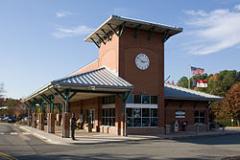



Cary ( /ËnkÉoÉori/) is the seventh largest city in North Carolina. Cary is in Wake and Chatham counties in the U.S. state of North Carolina. Located almost entirely in Wake County, it is the second largest municipality in that county and the third largest municipality in The Triangle after Raleigh and Durham. The town's population was 94,536 at the 2000 census, but the Census Bureau reported that its population had grown to 135,234 by 2010 (an increase of 43.1%), making it the largest town and seventh largest municipality statewide. Cary is currently the second most populous incorporated town in the United States. According to the US Census Bureau, Cary was the 5th fastest growing municipality in the United States between September 1, 2006, and September 1, 2007.
/ËnkÉoÉori/) is the seventh largest city in North Carolina. Cary is in Wake and Chatham counties in the U.S. state of North Carolina. Located almost entirely in Wake County, it is the second largest municipality in that county and the third largest municipality in The Triangle after Raleigh and Durham. The town's population was 94,536 at the 2000 census, but the Census Bureau reported that its population had grown to 135,234 by 2010 (an increase of 43.1%), making it the largest town and seventh largest municipality statewide. Cary is currently the second most populous incorporated town in the United States. According to the US Census Bureau, Cary was the 5th fastest growing municipality in the United States between September 1, 2006, and September 1, 2007.
Raleigh, Durham, and Chapel Hill make up the three primary cities of the Research Triangle metropolitan region even though today Cary is the 3rd largest city in the metropolitan area. The regional nickname of "The Triangle" originated after the 1959 creation of the Research Triangle Park, primarily located in Durham County, four miles from downtown Durham. RTP is bordered on three sides by the city of Durham and is roughly midway between the cities of Raleigh and Chapel Hill, and three major research universities of NC State University, Duke University, and UNC-Chapel Hill.
Effective June 6, 2003, the U.S. Office of Management and Budget redefined the Federal Statistical Areas and dismantled what had been for decades the Raleigh-Durham-Chapel Hill, MSA and split them into two separate MSAs. This resulted in the formation of the Raleigh-Cary, NC MSA and the Durham-Chapel Hill, NC MSA.
The Research Triangle region encompasses the U.S. Census Bureau's Combined Statistical Area (CSA) of Raleigh-Durham-Cary in the central Piedmont region of North Carolina. As of Census 2010 the population of the Raleigh-Durham-Cary CSA was 1,749,525. The Raleigh-Cary Metropolitan Statistical Area (MSA) as of Census 2010 was 1,130,490.
Located in the Piedmont region of the eastern United States, Cary is near North Carolina's Research Triangle. It is edged on the north and east by Raleigh, on the north and west by Research Triangle Park and Morrisville, on the south by Apex and Holly Springs, and on the west by the Jordan Lake area. The topography of the town is hilly.
Cary is in the Humid Subtropical climate zone. It receives hot summers and mildly cold winters, with an average of 7 inches of snow a year. Temperature extremes here range from the negatives to over 100 degrees Fahrenheit.
Hurricanes and tropical storms can affect Cary, usually after weakening substantially from being over land. Some, such as Hurricane Fran in 1996, have caused great damage in the area. Nearly all of Cary is in western Wake County, with neighborhood-sized sections in the northeast corner of Chatham County.
According to the United States Census Bureau, the town has a total area of 43.5 square miles (112.6 km ²). 42.1 square miles (109.0 km ²) of it is land and 1.4 square miles (3.6 km ²) of it (3.17%) is water. More recent Cary records show that as of 2007 the town has a total area of 52.79 mi ².
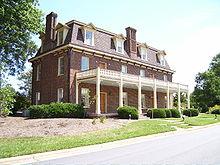
Today's Cary began in 1750 as a settlement called Bradford's Ordinary. About 100 years later, the construction of the North Carolina Railroad between New Bern and Hillsborough went through the town, linking Bradford's Ordinary to a major transportation route.
Allison Francis "Frank" Page is credited with founding the town. Page was a Wake County farmer and lumberman. He and his wife, Catherine "Kate" Raboteau Page bought 300 acres (1.2 km2) surrounding the railroad junction in 1854 and named his development Cary, after Samuel Fenton Cary (a former Ohio congressman and prohibitionist he admired). Page became a railroad agent and a town developer. He laid out the first streets in Cary and built a sawmill, a general store and a post office (Page became the first Postmaster). In 1868, Page built a hotel to serve railroad passengers coming through Cary. Cary was incorporated on April 6, 1871, with Page becoming the first mayor. In 1879, the Raleigh and Augusta Air-Line Railroad (later the Seaboard, now CSX Transportation) arrived in Cary from the southwest, creating Fetner Junction just north of downtown and spurring further growth.
In the early years Cary adopted zoning and other ordinances on an ad-hoc basis to control growth and give the town structure. Beginning in 1971, the town created Planned Unit Development (PUD) zoning to accommodate population growth related to the growth of Research Triangle Park nearby. A PUD allows a developer to plan an entire community before beginning development, thus allowing future residents to be aware of where churches, schools, commercial and industrial areas will be located well before such use begins. Kildaire Farms, a 967-acre (3.9 km2) Planned Unit Development in Cary, was North Carolina's first PUD. It was developed on the Pine State Dairy Farm by Thomas F. Adams, Jr. Adams named a section of Kildaire Farms "Farmington Woods" in their honor. The local government has placed a high value on creating an aesthetically pleasing town.
According to the 2010 Census, there were 135,234 people and 55,303 households in the city. The racial makeup of Cary was 73.1% White, 8.0% African American, 0.4% Native American, 13.1% Asian, 0.0% Pacific Islander, and 2.6% were from two or more races. People of Hispanics or Latino origin made up 7.7% of the population.
In terms of higher education, 68.0% of adult residents in Cary (ages 25 and older) hold an associate degree or higher, and 60.7% of adults possess a baccalaureate degree or higher. Cary has one of the lowest crime rates in the state for municipalities of its size. The home ownership rate (owner-occupied housing units to total units) is 72.8%.
In 2001, the town of Cary was declared the fourth safest of 327 large municipalities in the nation in the 8th Annual Morgan Quitno Safest (And Most Dangerous) City Award.
Cary's reputation as a bedroom community for affluent transplants from outside the South has led to humorous backronyms for its name such as "Concentrated Area of Relocated Yankees." Data from the 2000 Census shows 29.2% of Cary residents are native to North Carolina. 55.2% were born in other states. Additionally, 15.6% of the town's population were born outside the United States.
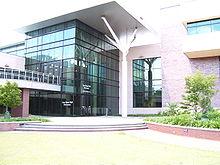
Cary has a council-manager government; the mayor and council members serve a four year term, with half of the council seats being up for election each odd-numbered year. Four of the six council seats are elected by district; the remaining two seats are at-large representatives.
The current town council consists of Mayor Harold Weinbrecht and Representatives Jennifer Robinson (District A), Don Frantz (District B), Jack W. Smith (District C), Gale Adcock (District D), Erv Portman (at-large), and Julie Aberg Robison (at-large).
On October 9, 2007, Harold Weinbrecht defeated then-mayor Ernie McAlister in the Cary, North Carolina, mayoral election of 2007. Citizen concern over the effect rapid growth was having on the town, especially on roads, schools, and the environment, led to McAlister's ouster.
On December 26, 2009, The Nation published an article on secret prisons in the United States run by Immigration and Customs Enforcement where suspected illegal immigrants can be held indefinitely before deportation. It was alleged that at least one of these secret federal prisons is located in an office building in Cary. A part of the federal government aos Department of Homeland Security, ICE has leased an office in Cary off Evans Road for more than 10 years. This location does not house detainees overnight. Other than protesters picketing the facility, there have been no issues associated with the Cary ICE office.
Read left to right.
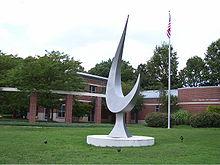
According to the Town's 2009 Comprehensive Annual Financial Report, the top employers in the city are:
Cary public schools were established in the late 19th century and are now part of the Wake County Public School System, the largest public school system in North Carolina.
Public transit within the town is provided by C-Tran, with six fixed-routes. There is also a door-to-door service for the elderly (55+) and riders with disabilities. Triangle Transit operates fixed-route buses that serve the metropolitan region and connect to the local municipal transit systems in Raleigh, Durham and Chapel Hill.
Amtrak's Silver Star, Carolinian and Piedmont passenger trains stop at the Cary Amtrak station. They offer service to Charlotte, New York City, Miami, and intermediate points.
The League of American Bicyclists has designated Cary one of the fourteen recipients of the first Bicycle-Friendly Community awards for "providing safe accommodation and facilities for bicyclists and encouraging residents to bike for transportation and recreation".
The Maine-to-Florida U.S. Bicycle Route 1 passes through suburban Cary, as does N.C. Bicycle Route #2, the "Mountains to Sea" route.
Cary Greenways and Trails maintains a network of sidewalks and paved trails connecting neighborhoods and parks throughout the town. These greenways place strict requirements on environmental conditions to preserve a park-like atmosphere. In addition, standard sidewalks and paths exist throughout the town.
The Raleigh-Durham International Airport, located north of Cary via Interstate 40 between Cary, Raleigh and Durham, serves Cary and the greater Research Triangle metropolitan region. Raleigh-Durham offers more than 35 destinations, serving approximately 9 million passengers per year.
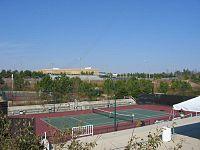
Cary has four sister cities, as designated by Sister Cities International:
Word Count: 2492






